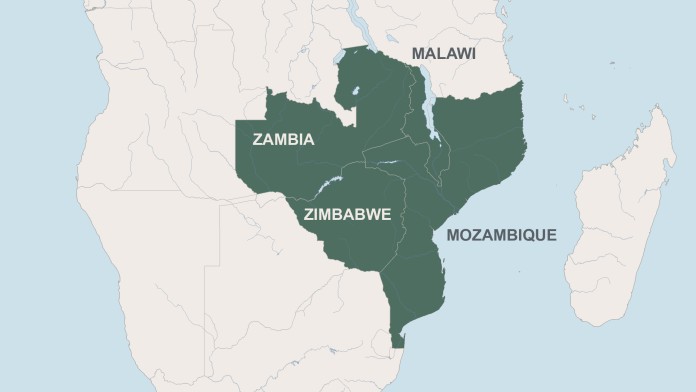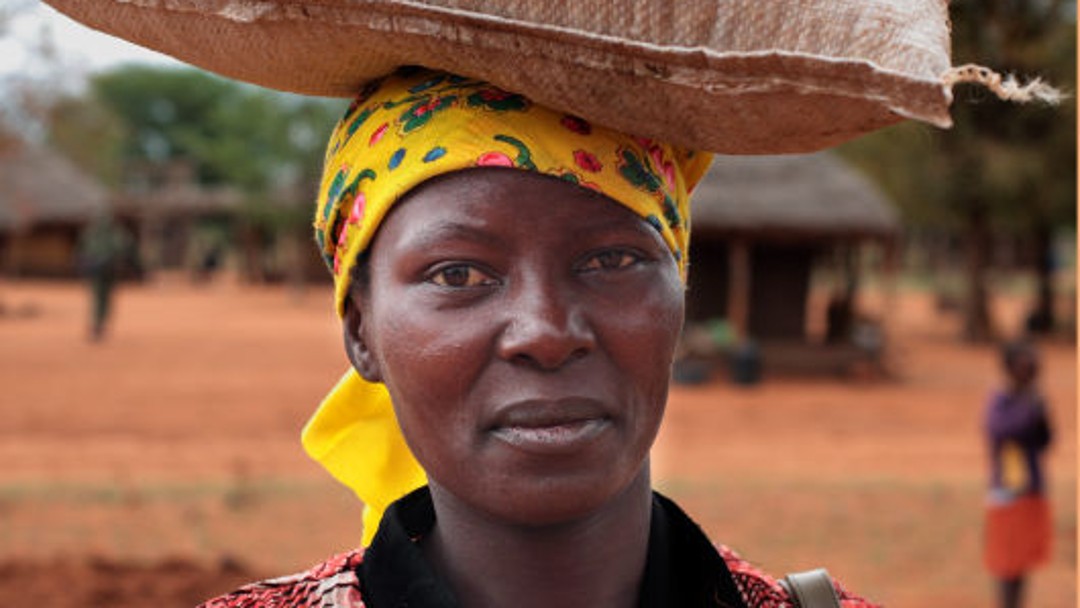
As of: 03/2024
In Southern Africa, the consequences of the economic shocks that have occurred in recent years are evident. The combined effects of the coronavirus pandemic, inflation and rising world market prices as a result of the Russian war in Ukraine are having a negative impact on the region’s economy. As a result, more people are falling into poverty and hunger is spreading. Therefore KfW, acting on behalf of the German Federal Govern-ment, is participating in a World Bank project and its Social Cash Programme in Zambia. KfW is supporting similar programmes in Zimbabwe, Malawi and Mozambique. These programmes have a common objective: to provide cash to particularly vulnerable families. The money is a form of unconditional basic income and is used to cover daily needs and to enable children to attend school. In some countries, cash payment is linked to other programmes, such as cookery courses.
In Zambia and other countries in Southern Africa, food prices have risen sharply in recent years – to the extent that many families are no longer able to feed themselves adequately.
In addition to the current severe drought, the extremely dry weather of preceding years and the pandemic, the Rus-sian war in Ukraine is exacerbating poverty because it has disrupted global supply chains, which has also led to higher prices for energy, food and fertilisers in Zambia. This creates a vicious circle whereby the high prices result in less fertiliser being used, which in turn reduces agricultural yields and makes the produce even more expensive. Although food price inflation has declined somewhat, the consequences are still evident. The situation in Mozam-bique is similar. Economic growth is slowing in Malawi, while inflation is rising there too. And Zimbabwe has been struggling with an economic depression since the early 2000s, characterised by high unemployment, persistent hy-perinflation and increasing poverty. The higher prices combined with supply bottlenecks have a particularly adverse effect on women, children and the elderly, whose situation has deteriorated in recent years and who therefore need additional support.

In Zambia, the state has been paying social benefits to the poorest since 2003. Notwithstanding the fiscal challeng-es, it has been possible to maintain the social security system. KfW is supporting cash transfers on behalf of the German Federal Ministry for Economic Cooperation and Development (BMZ) by contributing almost EUR 20 million, which is paid into a World Bank fund that other donors also participate in. To date, over one million households, representing half of Zambia's impoverished population and including single mothers in particular, have received bimonthly payments in this manner. The payments currently amount to 400 Zambian Kwacha (ZMW) per household, which equates to approximately EUR 14 per month. This is sufficient to allow families to eat two meals a day in-stead of one.
KfW also provides funds for comparable programmes in other countries in Southern Africa. For example, it works in partnership with the World Food Programme (WFP) in Mozambique, with the Ministry of Gender, Community De-velopment and Social Welfare (MoGCDSW) in Malawi and with UNICEF in Zimbabwe. In Malawi, the BMZ has been financing cash transfers in seven of the country’s 28 districts since 2012. The remaining 21 districts are covered by the World Bank (11), the European Union (7), Irish Aid (2) and the Malawi Government (1).
In Zambia, Zimbabwe and Mozambique, the cash transfers are accompanied by additional programmes. In Mozam-bique, culinary training is also offered and mobile phones are handed out. Recipes and tips on nutrition are then circulated via the telephone. Giving mobile phones to women enhances their autonomy and financial inclusion. Ad-ditionally, text messages are sent out in Zimbabwe. Health promoters offer courses. In schools, the school meals are financed. In Zambia, people with disabilities receive special support under the Social Cash Transfer programme. Transfer payments in Zambia are complemented by an education initiative for vulnerable and poor girls, who can then attend school as a result. The project is designed to benefit women because in Zambia, it has been shown that households headed by women are more likely to be poor.
For families receiving social benefits, this does not just mean having more disposable income. In the medium term, these benefits can also lead the way out of poverty. The support also offers recipients new economic perspectives because for the first time, many of them have their own money, can save and can decide how and what to spend it on. This creates a great deal of self-determination and facilitates investment in items such as in a small business or new equipment. It means that these women can generate income – and improve their situation in the long term. Many of the beneficiaries organise themselves into savings groups, exchange information and become smart about finances. In this way, women gain access to loans. These loans also open up pathways out of poverty. It is also important for families to eat more varied and healthier foods, and that they can create a more solid basis for their entire existence.
The payment is mainly sent as a voucher by mobile phone. The voucher can be redeemed digitally or converted into cash at a payout point. The beneficiaries, many of whom had not previously owned a mobile phone, learn how to use the device. Training courses are also part of the programme. Knowledge of the online money system opens up many new opportunities in the everyday lives of these women. The payments also reach people in remote locations – where there is no access to a mobile network or electricity, the benefits are paid out when signed for or, for those who cannot write, when a fingerprint is supplied. The World Bank programme supported by funds from the BMZ also provides scholarships for girls to attend school.
To date, around 1.3 million households in Zambia alone have benefited from transfer payments; this means that more than half of the population classified as poor and more than two-thirds of those considered extremely poor in Zambia could be reached. Some of the women to benefit reported that they were able to save some of the money and buy cattle after a while. Others have opened a snack or a small food cart. Others have bought an ice cream maker and earned income in that way. The investments of the women involved may vary but the effect is almost always the same – the Social Cash Transfer programme helps reduce hunger and the most severe poverty.
More than 130,000 girls in Zambia have also received educational grants and so were able to enter or resume sec-ondary school. This has significantly exceeded the actual target of 80,000 girls. More than 430 young women with secondary school qualifications have also received a scholarship for university studies.
Combining the cash payments with other programmes such as training, advisory services and cookery courses increases the impact of the programmes.
The project contributes to the achievement of these following United Nations Sustainable Development Goals:
KfW Group
KfW Development Bank
Southern Africa
Share page
To share the content of this page with your network, click on one of the icons below.
Note on data protection: When you share content, your personal data is transferred to the selected network.
Data protection
Alternatively, you can also copy the short link: https://www.kfw-entwicklungsbank.de/s/enzB06Nh
Copy link Link copied